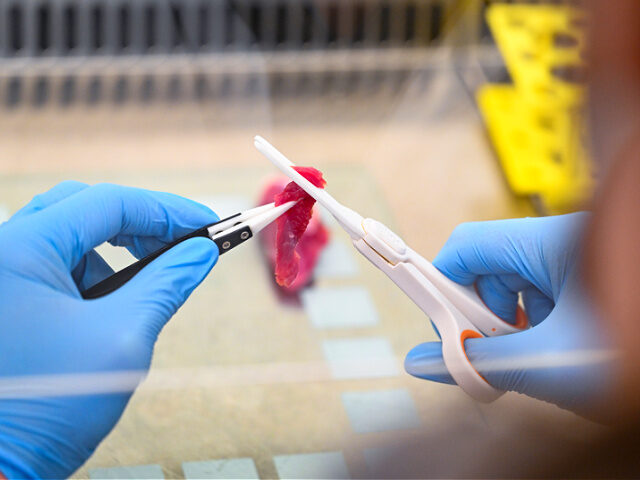Yuval Noah Harari, historian, futurist, and World Economic Forum (WEF) adviser, described “cultured meat” synthesized in laboratories as more “ecological” and “ethical” than meat from animal husbandry and slaughter.
He made his remarks in a video interview with the International Institute of Management in Kyiv, Ukraine.
The WEF described “cultured meat” as a “sustainable” substitute to human consumption of animals in order to “save the planet” from “carbon emissions”:
The process of growing meat in a laboratory involves taking stem cells from a live animal and growing them in nutrient-rich conditions.
For example, a small biopsy of skeletal muscle is taken from a cow, from which the stem cells are isolated and grown in a bioreactor with cell culture media.
The cells are split into several cell types including muscle and fat cells. This biomass is then processed to form the edible final product.
Harari framed human consumption of animals as unsustainable. He said, “We can find ways to provide what people need in more ecological and sustainable ways. This is the best course forward. It’s not stopping development and it’s not ruining the ecosystem, [but] finding new ways to continue developing in a sustainable way, and it can be done.”
Relevant remarks begin at 36:25:
Harari remarked:
Think about food. You have hundreds of millions of people now beginning to consume meat in places like China, India, Brazil, [where] they didn’t have the money to buy meat previously. Now, as economic prosperity rises a little, meat consumption goes up. Meat is one of the biggest sources of air pollution and water pollution around the world.
Now, if you tell these people, “No, you can’t eat meat because it ruins the environment,” they won’t accept [it].
But there are new technologies [with which] you can produce meat, just by growing it in cells, it’s called “cultured meat” or “clean meat,” and it is much more ecological. It’s also much more ethical, because if you want to hamburger you don’t need to raise a cow and then kill the cow to have a hamburger. You just grow the hamburger. It’s much more ethical. It’s much more ecological.
This is the technological middle path. Technology is not the opposite of nature. It’s not the enemy of nature.
Harari cast “climate change” as an “existential” threat to humanity.
“Humanity is facing existential common challenges [and] threats,” he stated. “Whether it’s climate change, whether it’s the rise of artificial intelligence, [or] whether it’s destabilizing forces like the Putin regime.”
Greater consolidation and concentration of political power is necessary to address to aforementioned “existential common challenges,” Harari added. He highlighted the European Union (EU) as a “successful” model of multistate integration to be followed by future political projects of globalization.
He concluded, “The European Union is an extremely successful experiment. There has never been before in history such a thing [with] so many countries coming together to form this economic and political bloc, while retaining their independence.”

COMMENTS
Please let us know if you're having issues with commenting.